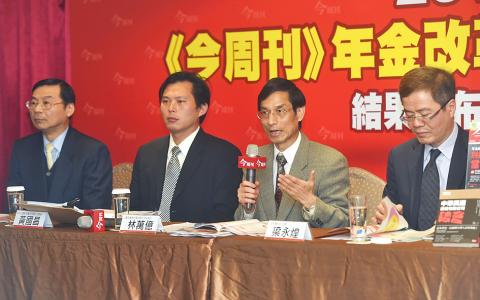Pensions paid to veterans, civil servants and teachers are “outrageously high,” New Power Party (NPP) Executive Chairman Huang Kuo-chang (黃國昌) said yesterday, pledging his party’s support for any pension reform proposed by the incoming administration of president-elect Tsai Ing-wen (蔡英文) of the Democratic Progressive Party (DPP).
“The pension situation has already reached the point where it is almost burning our eyebrows,” Huang said at a forum organized by the Chinese-language Business Today, which released a survey that found 85 percent of legislators support pension reform.
“Reform has to start immediately before the system goes bankrupt,” Huang said, adding that “outrageously high” benefits are being paid to veterans, civil servants and teachers, which reach as high as 90 percent of their regular salaries even though they usually retire in their 40s or early 50s.

Photo: Chien Jung-fong, Taipei Times
“When you look at that figure, it is clear why national pensions have run into such a big problem,” Huang said, calling for members “of all professions” to support pension reform.
Pensions vary based on profession, with benefits for government employees substantially higher on average than those awarded to people in other professions, Huang said.
Huang pledged his party’s “full support” for any pension reform plan proposed by the incoming administration, while urging caution in the design of the pension reform commission and national policy conference to which Tsai said she would entrust responsibility for drafting specific reforms.
“The pension reform commission issue is extremely complicated, with many problems that need to be addressed,” he said, adding that care has to be taken to ensure that special-interest representatives appointed to the commission are truly representative and that they would not drop out of the consultative process if it became clear that they would be affected by reforms.
National Taiwan University professor of social work Lin Wan-yi (林萬億), a key adviser to Tsai in pension policy, said that the incoming government would take specific policy stances on the issue only after the members of the proposed pension reform commission and national policy conference reach a consensus.
Lin did not say whether pension benefits for government employees would have to be cut.
“No one will be targeted for a ‘first stab,’ because we will not be holding knives,” he said.
Lin said that former Examination Yuan president John Kuan (關中), who was responsible for a failed reform effort by President Ma Ying-jeou’s (馬英九) administration, has told him that past reform efforts failed because inadequate communication and a top-down approach led to a lack of public trust.

A preclearance service to facilitate entry for people traveling to select airports in Japan would be available from Thursday next week to Feb. 25 at Taiwan Taoyuan International Airport, Taoyuan International Airport Corp (TIAC) said on Tuesday. The service was first made available to Taiwanese travelers throughout the winter vacation of 2024 and during the Lunar New Year holiday. In addition to flights to the Japanese cities of Hakodate, Asahikawa, Akita, Sendai, Niigata, Okayama, Takamatsu, Kumamoto and Kagoshima, the service would be available to travelers to Kobe and Oita. The service can be accessed by passengers of 15 flight routes operated by

Chinese spouse and influencer Guan Guan’s (關關) residency permit has been revoked for repeatedly posting pro-China videos that threaten national security, the National Immigration Agency confirmed today. Guan Guan has said many controversial statements in her videos posted to Douyin (抖音), including “the red flag will soon be painted all over Taiwan” and “Taiwan is an inseparable part of China,” and expressing hope for expedited reunification. The agency last year received multiple reports alleging that Guan Guan had advocated for armed reunification. After verifying the reports, the agency last month issued a notice requiring her to appear and explain her actions. Guan

GIVE AND TAKE: Blood demand continues to rise each year, while fewer young donors are available due to the nation’s falling birthrate, a doctor said Blood donors can redeem points earned from donations to obtain limited edition Formosan black bear travel mugs, the Kaohsiung Blood Center said yesterday, as it announced a goal of stocking 20,000 units of blood prior to the Lunar New Year. The last month of the lunar year is National Blood Donation Month, when local centers seek to stockpile blood for use during the Lunar New Year holiday. The blood demand in southern Taiwan — including Tainan and Kaohsiung, as well as Chiayi, Pingtung, Penghu and Taitung counties — is about 2,000 units per day, the center said. The donation campaign aims to boost

The Central Weather Administration (CWA) said a magnitude 4.9 earthquake that struck off the coast of eastern Taiwan yesterday was an independent event and part of a stress-adjustment process. The earthquake occurred at 4:47pm, with its epicenter at sea about 45.4km south of Yilan County Hall at a depth of 5.9km, the CWA said. The quake's intensity, which gauges the actual effects of a temblor, was highest in several townships in Yilan and neighboring Hualien County, where it measured 4 on Taiwan's seven-tier intensity scale, the CWA said. Lin Po-yu (林柏佑), a division chief at the CWA's Seismological Center, told a news conference